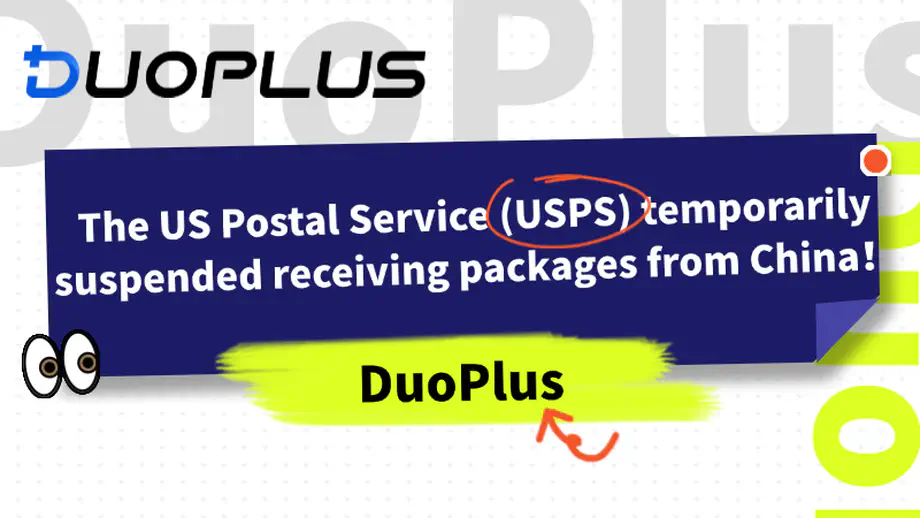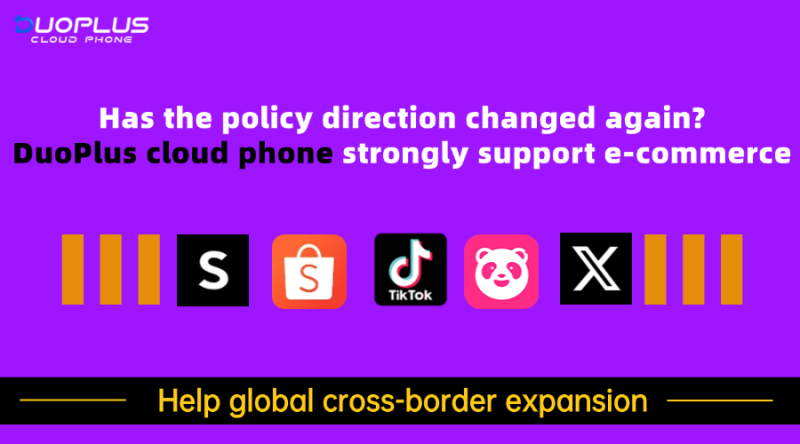
DuoPlus cloud mobile phone has achieved a dual upgrade in "Renewal Management + Batch New Device Creation"
Introduction: In this new era of rapid change, every small shift can lead to new trends in the industry. DuoPlus Cloud …

The cause of the incident is quite simple. On February 4th, the United States Postal Service (USPS) suddenly announced a temporary halt on accepting packages from mainland China and Hong Kong until further notice. This news immediately caused a stir in the cross-border e-commerce community. At first glance, this seemed like an unexpected ‘undercurrent,’ but upon closer examination, it was found to be linked to the Trump administration’s tariff policy on Chinese goods, which took effect on February 4th, almost simultaneously.
As one of the largest civilian postal services in the United States, USPS’s decision to temporarily halt the acceptance of Chinese packages undoubtedly sent a strong signal: Sino-US trade friction might escalate further. The miraculous scene was that on February 5th, another notice was issued: USPS resumed all postal services for packages from China and Hong Kong…
This self-contradictory move undoubtedly made many cross-border e-commerce sellers feel like they were on a roller coaster. Below is the latest announcement from USPS:
Update: International Inbound Mail and Packages from China and Hong Kong
Starting February 5, 2025, postal services will continue to accept all international inbound mail and packages from China and Hong Kong. The United States Postal Service (USPS) is working closely with Customs and Border Protection to implement an effective fee collection system to address the new Chinese tariffs, ensuring minimal disruption to the delivery process.

Before 2016, the US duty-free threshold for imported goods was $200. After 2016, this threshold was raised to $800, which was very favorable for small-value imports.
Recently, while USPS temporarily halted package acceptance, Trump also canceled the duty-free policy for Chinese goods, meaning the ’low-value duty-free’ policy under $800 is no longer effective, and a 10% tariff is imposed on Chinese goods. Mexico and Canada are also among the countries with increased tariffs.
Previously, packages valued under $800 could be exempt from tariffs and did not require detailed customs declarations, which was undoubtedly a boon for cross-border e-commerce relying on low-cost direct mail. Now, with this policy canceled, it means every package must ‘pay the price’ in tariffs, and rising costs are inevitable.
For Chinese cross-border e-commerce platforms like Temu and SHEIN, this is adding insult to injury. Imagine, they have to ship millions of products to the US market every week, and now not only are tariffs rising, but transportation costs are also soaring, squeezing profit margins significantly. Third-party sellers on Amazon are feeling the pressure directly, with reduced orders and increased returns. Some sellers and e-commerce companies are already considering setting up warehouses in the US to adapt to the changing situation. Could this also be part of someone else’s plan?
In comparison, small and medium-sized cross-border e-commerce sellers need to face the enormous pressure brought by this new policy.

Many netizens have complained about this:
The cancellation of duty-free will consume more customs resources, slowing down customs clearance.
Multiple administrative orders in one day, changing from morning to evening, ultimately becoming part of someone else’s play?
Every day is a rehearsal, this play is over, and the next one is being prepared…
Facing such a severe situation, how should cross-border e-commerce businesses respond? In fact, challenges always come with opportunities. Here are some personal thoughts and suggestions:
In the past, many cross-border e-commerce platforms were overly dependent on the US market, and once policies changed, they would suffer. Now, it’s time to consider expanding into more markets. Europe, Southeast Asia, and Australia also have huge consumer potential. Diversifying market risks can provide support from other markets when one faces policy turbulence.
Specific Measures:
The rise in logistics costs brings direct pressure to cross-border e-commerce. At this time, optimizing supply chain management becomes particularly important. Collaborating with more overseas warehouses can not only reduce transportation time and costs but also improve customer shopping experience. Additionally, using advanced technological tools like big data and artificial intelligence to accurately forecast market demand and optimize inventory management is also an effective way to improve operational efficiency.
Specific Measures:
In a cost-pressured environment, relying solely on low-price strategies is no longer sustainable. Cross-border e-commerce needs to shift towards brand building, enhancing the added value of products and consumer brand loyalty. By offering quality products, excellent customer service, and unique brand stories, attract more loyal consumers, reduce dependence on price wars, and also apply advanced technology to enhance competitiveness.
Specific Measures:
USPS’s temporary halt on accepting Chinese packages and Trump’s latest tariff policy indeed pose significant challenges for Chinese cross-border e-commerce. However, there are always opportunities in adversity, and the key lies in how we respond. Through diversified market layout, optimized supply chain management, enhanced brand value, compliant operations, and the use of advanced technological tools, Chinese cross-border e-commerce can confidently move forward in the turbulent international trade environment.
Don’t let the winds of policy capsize your small boat. Choose DuoPlus Cloud Mobile, and face the changing situation with firm belief and flexible strategies. DuoPlus stands with you shoulder to shoulder!


Introduction: In this new era of rapid change, every small shift can lead to new trends in the industry. DuoPlus Cloud …

DuoPlus Cloud Smartphone leads the technological trend, powered by Android 15 online! Specially designed for …
No need to purchase multiple real phones.
With DuoPlus, one person can operate numerous cloud phones and social media accounts from a single computer, driving traffic and boosting sales for you.
